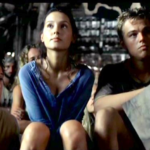Tim Leffel is author of several books, including The World’s Cheapest Destinations (in its 3rd edition) and Travel Writing 2.0: Earning Money from your Travels in the New Media Landscape. He is the editor of the narrative webzine Perceptive Travel and runs several travel blogs, including Practical Travel Gear and the Cheapest Destinations Blog.
How did you get started traveling?
To be honest, my girlfriend (now my wife) pushed me into it. She said, “I’m going traveling around the world whether you want to come with me or not.” A bit later I got fired from my job and her company went out of business. If I was still waiting for a sign that this was our fate, I’d have to be blind. So the first of what would become three trips around the world began — each lasting at least a year.
How did you get started writing?
I was already doing a lot of corporate writing in my job — mostly trying to make crappy bands sound like they were the next big thing in sales copy and bios for RCA Records. So it seemed a pretty natural transition to move into travel writing since I was going to be on the road for at least a year straight. I did my homework first, read the right books, and then persevered through the rejections. I got better over time and started getting more frequent assignments.
What do you consider your first “break” as a writer?
I got a few one-off articles published here and there, but my two biggest breaks came around the same time during that first long trip. The late Clay Hubbs published a couple of my pieces for Transitions Abroad when it was a print magazine and the trade publication Star Service hired me to review a bunch of hotels in Turkey — 48 if I remember right. More than a decade and a half later, I’m still writing for both of them as a freelancer, though now both have become digital publications.
As a traveler and fact/story gatherer, what is your biggest challenge on the road?
Well, it’s a lot easier now than when I started, when I had to shoot film camera slides and post them from Bangkok or Cairo after getting them developed locally, praying they would actually arrive on the other end. Now my biggest challenge is doing what I need and want to do in the place and moment while still continually maintaining multiple websites and blogs that are part of my media company. It’s a bit much to juggle sometimes.
What is your biggest challenge in the research and writing process?
It’s always tough finding enough time to cram in everything I need to do research-wise while still building in enough unscripted wandering and talking time to get to the real angle. Making a living at this and supporting a family, I don’t get to do as much aimless traveling as I used to, with lots of time for story ideas to bubble up and simmer slowly. Every day matters when I’m on the road. The actual writing part is the easiest part of the gig, for me anyway. Like most newspaper reporters, I’ve never had time for the notion of writer’s block. There’s always a deadline to hit.
What is your biggest challenge from a business standpoint?
I’m not doing much print work anymore. The ratio of time spent for money earned just isn’t as attractive as owning my own content and running with great ideas instead of dealing with pocket vetoes from scared gatekeepers. As I’ve weaned myself off print more each year and found ways to create steady income streams from my work, life has gotten much less challenging from a business standpoint. I’m feeling better about the future than I ever have. Making a STEADY and consistent living is always a challenge of course, which goes for anyone who is self-employed.
Have you ever done other work to make ends meet?
Yes, quite a few things, especially before I got established. I think it’s next to impossible to be a full-time freelance writer until you have at least a few years of experience pursuing it hard. Having a “real job” at the same time (or a breadwinning spouse) keeps you from being a starving artist for years on end. Most of what I’ve done on the side has had at least some kind of writing responsibility though, even though there were some marketing and sales functions in the mix sometimes. Those other jobs have helped my business skills a lot, so I’m glad I got the non-writing experience along the way. For the past few years, fortunately, I’ve been doing well just as a writer/editor/blogger and have been able to permanently leave the cubicle behind and still keep the mortgage paid.
What travel authors or books might you recommend and/or have influenced you?
There’s a list of my favorites here, but like a desert island discs list, it keeps changing over time. I haven’t read half the older books I want to read though, especially since I’m reviewing travel book for Perceptive Travel a few times a year, which guides a lot of what’s on my nightstand. I think the Travelers’ Tales anthologies are consistently the best collections of good travel writing, but of course it’s important to just read good literature period and learn from that. Other creative non-fiction too, in business, politics, sports, whatever — good writing transcends categories. It’s also important to watch quality films, listen to music with great lyrics, listen to talk shows where nobody shouts, and watch quality dramas when the TV is on. Fill your brain with great influences if you want to grow as a writer — don’t waste time with mindless drivel.
What advice and/or warnings would you give to someone who is considering going into travel writing?
Well I’ve got close to 250 pages on that subject in Travel Writing 2.0, so I’m going to make this one my commercial plug answer — go get the book! It has input from 52 other writers as well, including you. (Thanks Rolf!)
What is the biggest reward of life as a travel writer?
Rewards are not hard to find in this endeavor, which is why there’s so much competition. The greatest reward is exploring new places and experiencing the world in a richer and deeper way than I would ever be able to experience it otherwise. Also, being able to do more traveling period, from both a financial standpoint and a time standpoint, than I could otherwise. When you’re a travel writer, it’s perfectly fine to be taking off every month or two — with pay! Plus the job is a license to follow up on my curiosity. If I want to find out more about sadhus in India, a 225-mile biking trail in Missouri, the Manhattan Project’s secret city, or Hungarian wine, I can indulge that desire to learn and bring a story to life that didn’t exist before. How cool is that? I look forward to every workday, which is a dream situation.





